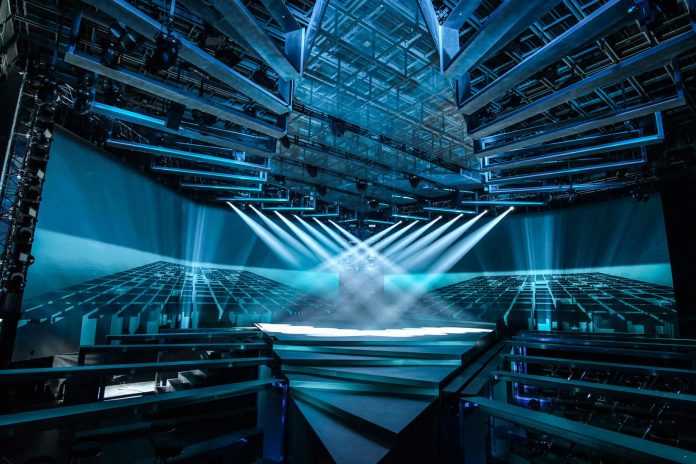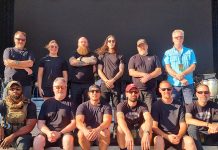
Slovenians embarked on this year’s Eurovision Song Contest selection event, Popevka Song Contest, organised by Radiotelevizija Slovenija (RTV SLO) and staged at their main studios in capital city Ljubljana over three weekends, featuring two semi-finals and a final, all broadcast live on national television.
Lighting Designer, Crt Birsa utilised 66 Robe moving lights including 13 FORTES, to ensure the challenge of lighting his seventh ESC selection offered plenty of vibrance and flair. He was tasked with creating 24 environments in which the contestants could perform their entries, for which he collaborated closely with Set Designer, Greta Godnic; Video Content Creator, Den Baruca and Director, Nejc Levstik.
Birsa was using FORTES for the first time. These were supplied – together with all the supplemental show lighting which also included 53 other Robe fixtures – by Slovenian rental specialist, Event Lighting. Birsa’s design also took advantage of lights in the TV studio’s house rig. According to Birsa, the event presented “a perfect opportunity” to harness Event Lighting’s newly purchased FORTES.
The director’s brief included wanting to see a lot of contrast between the different artists, so Greta hit on the idea of having two totally different setups – offset by 90 degrees to one another – on the same stage, allowing performers and cameras to simply turn around to present a dramatically different ‘stage’ and visual picture in the background.
The first look had a large upstage LED screen that set the visual aesthetic, with light sources present but hidden from view, which contrasted sharply with architecture on the other scene that was more defined by lighting beams and looks, with the physical hardware largely concealed, but the sources and effects extremely present.
FORTES were positioned on the floor, filling the background area of both spaces and blasting powerful beams and gobo looks in from upstage. As the only lights deployed on the floor, they also had a strategic role, hidden behind the horizon of the 1.8-meter-high stage piercing all the camera shots with their fabulous fat beams.
“I loved the beams, the intensity, the colours as well as the general smoothness, and they worked very reliably and accurately through all the broadcasts,” he said, adding that he also appreciated the refined colour mixing – both the CMY system and the colour wheels – and he enjoyed the new contemporary gobo selection. “They are a brilliant moving light for live events,” he remarked.
Also on the rig were 19 Robe MegaPointes and 15 Pointes, which Birsa dubbed as ‘must haves’ on his lighting plots. The latter were positioned on three vertical sections that provided side lighting on one stage view and strong bursts as a central vertical for the second one. Around 19 MegaPointes were rigged and hidden above the LED screen on three slightly asymmetrical trusses.
Two Robe BMFLs were used for the key lights on each stage view and 11ParFects were used for lighting the lower sections of set. Birsa used six Robe Square 5×5 matrix moving LED wash fixtures as ‘specials’, which were flown and hidden upstage behind the scenic, providing a surprise factor. “In the right context these are really great looking lights,” he commented.
The creative team started work on the project in November 2021. Their workflow included visualising the set, lighting and video in WYSIWYG allowing all to properly see the juxtaposition and synergies of the different elements as they received music from the different artists and decided on the base looks for each piece.
On site, lighting was programmed by Birsa, a complex task due to the asymmetric design and the shared and individual lighting aspects for the two different set-ups. Each contestant’s song was timecoded for precision and the camera shots and vision mixing were pre-programmed using CuePilot.
For the first time this year the key lighting was under the creative team’s direct control rather than the studios, and this was operated by Klemen Krajnc working alongside Birsa, both using their own consoles.
With his design, Birsa strived to prove that a minimalist approach to lighting with the right fixtures, set and visual design produces the diverse and vibrant looks that everyone wanted. “Shows like this can easily slip into being formulaic, so we needed to ensure that it was a totally stand out production,” concluded Birsa.
Slovenia’s winning entry was Disko by LPS who will represent the country in this year’s Eurovision Song Contest Finale in Turin, Italy in May.





